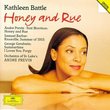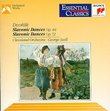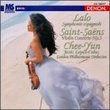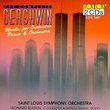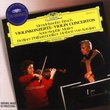| All Artists: Vishnevskaya, Rostropovich, Oistrakh Title: Russian 'Live' Recordings From The Sixties Members Wishing: 0 Total Copies: 0 Label: Melodiya Release Date: 6/16/1998 Genres: Pop, Classical Styles: Vocal Pop, Opera & Classical Vocal, Historical Periods, Modern, 20th, & 21st Century, Symphonies Number of Discs: 1 SwapaCD Credits: 1 UPC: 743215323723 |
Search - Vishnevskaya, Rostropovich, Oistrakh :: Russian 'Live' Recordings From The Sixties
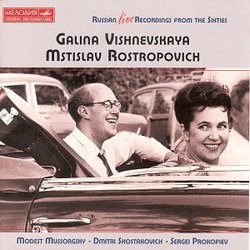 | Vishnevskaya, Rostropovich, Oistrakh Russian 'Live' Recordings From The Sixties Genres: Pop, Classical
Shostakovich's orchestrations for Mussorgsky's Songs & Dances of Death heightens the music's stark, desolate qualities, without shying away from ear-catching instrumental combinations. Galina Vishnevskaya's raw-nerve... more » |
Larger Image |
CD DetailsSynopsis
Amazon.com Shostakovich's orchestrations for Mussorgsky's Songs & Dances of Death heightens the music's stark, desolate qualities, without shying away from ear-catching instrumental combinations. Galina Vishnevskaya's raw-nerve response to the texts and affinity for the composer's sound world border on the clairvoyant. Her husband is a better accompanist at the piano than on the podium, providing firm support in Shostakovich's Satires and Prokofiev's Five Poems by Anna Akhmatova. The world premier of Shostakovich's Seven Romances to Poems by Alexander Blok finds Mstislav Rostropovich at the cello where he belongs, playing as gorgeously as David Oistrakh. The violinist and the soprano, though, are not quite attuned to each other during their duet. An absorbing occasion, nonetheless, and kudos to Melodya for making these performances available for the first time. --Jed Distler Similarly Requested CDs
|
CD ReviewsVery important release tenor_in_training | 03/02/2000 (5 out of 5 stars) "This CD comes with thorough liner notes, it is beneficial to read them before actually listening to the music. The reviewer below, obviously knowledgeable, attempts to praise this recording, but since he mixes in so much of vocal technique examination into it, the results are somewhat strange. I urge the classical music and opera fans to read the book "Galina" which is a brilliantly written autobiography, which is not only one person's life story, but also the picture of Russian times and events through the eyes of incredibly intelligent, witty, and emotional observer and participant. Reading it would help to fill in the blanks and understand the significance of this recording. First of all, the "Songs and Dances of Death" cycle was orchestrated by Shostakovich especially for Galina Vishnevskaya. His very close friend and one of the all-time musical giants Mstislav Rostropovich follows the score with utmost respect and precision. It's a great, unforgivable mistake to claim that he "belongs at the cello" as Ted Libbey suggests - Maestro Rostropovich is a fantastic conductor with impeccable musical instincts and phenomenal insight. Moreover, he might as well be the ONLY person to conduct these works because his personal affiliation with the composers allowed for unprecedented level of expertise. Just listen to his complete cycle of Shostakovich's symphonies or "Lady Macbeth of Mtsensk" for more examples of brilliant conducting.The satires were written by Sasha Cherniy at the beginning of the century, but once set to music to Shostakovich they became a weapon against the Soviet regime and as a result subsequently banned, with a particular emphasis on "The Descendants". Now, not only Vishnevskaya has the most expressive voice, it is also one of the most beautiful voices ever recorded. Hers is a true spinto without the usual "pushed up" meaning to it that characterizes most other spinto voices. As to Tebaldi, for instance, this sound came naturally to her and allowed for immense power and incredible vocal range. This recording with its customary Melodiya problems hardly does it justice. Turn to "Boris Godunov", "Lady Macbeth of Mtsensk", or "Turandot" to hear it at its full glory. Philips used to carry a great CD called "The Early Years"; look for it. No, she did not sing "too many Leonoras" -- that's a gross mistake; while Leonora in Fidelio was her Bolshoi leading role debut, her favorite role was Aida and with it she subjugated the greatest opera houses, MET included. Had you heard it, you would not guess it's the same voice! The so-called "ugly" overtones in Songs and Dances of Death are clearly done on purpose: Vishnevskaya here acts with her voice to imitate Death the character, making it terrifyingly vivid and real. Same goes for "shrieking" on fast passages, here she uses a folk-song like approach, emphasizing the close connection that Russian composers have to their roots. Had this disc included other Mussorgsky songs, particularly "Where art thou, little star?" everyone would be astonished how enchantingly beautiful her voice could be. Another example is her Liu in Turandot, when she sang opposite Franco Corelli and Birgit Nilsson; it's available both on Myto and Opera d'Oro. Finally, one of the greatest musical achievements is Britten's War Requiem. Once again, it was written FOR her voice and she set an unsurpassed standard for it. Power, grace, and fully involved approach to music are her trademarks, this CD is really a small example but it's extremely important in terms of first performances of great works of great composers." Viva Vishnevskaya tenor_in_training | 11/10/1999 (4 out of 5 stars) "What we have here is a result of a unique teamwork of musical giants of the 20th century. Shostakovich, Vishnevskaya, Prokofiev and Rostropovich are not the names one dismisses lightly (well, not in the Stalinism-free world). One uses here a term `team work' because at the time the items on this disk were recorded, an outstanding musical performance was conceded possible only as a result of a team effort. In this case a team of Galina Vishnevskaya and Mstislav Rostropovich. Though Vishnevskaya is a soloist, she is not a singer delivering pretty songs - she is an `instrument' contributing to the total framework of emotionally charged compositions. This music can only gain from such an approach. Hers is not a beautiful voice, but it is expressive and emotional. In `Songs and Dances of Death' Vishnevskaya is not afraid to sound ugly if the mood of the song so requires. At the same time it is not simply `doom and gloom' that the singer strives for- but a more complex atmosphere of hopelessness and despair. (One tends to think that the reason for the lack of hilarity in Russian music accounts less for the idea that Russians are boring hypochondriacs and more for the fact that Russian life had generally showed (and still does) little happiness. Vishnevskaya has an extensive vocal palette and uses it abundantly in order to reach her goal. To see the singer's prowess in this field one only has to compare hers to the recordings of the cycle by Hvorostovsky.The satires cycle is outstanding for its witty and sarcastic text and Shostakovich's clever use of popular melodies. It is a shame that the booklet does not include the text of the songs and just the resume - despite Vishnevskaya's expressiveness, people who do not speak the language are going to miss on some of the songs' impact.What one finds questionable here is some aspects of Vishnevskaya's vocal technique - when sang at forte, her top notes become unsteady and, very often, shrill and wobbly (too many Leonores, perhaps?). She is better in the slower passages where she can expand her voice and float her higher notes with greater freedom. These song-cycles offer an exceptional opportunity to hear music the way it was intended to be performed by the music's composers. Everything on this disk had been recorded live which adds to the atmosphere of excitement projected by the audience. Shostakovich's settings of Block songs is a world premier and what could be more exciting than listening to woman singing music which was dedicated to her! And she deserved the honour!"
|

 Track Listings (21) - Disc #1
Track Listings (21) - Disc #1